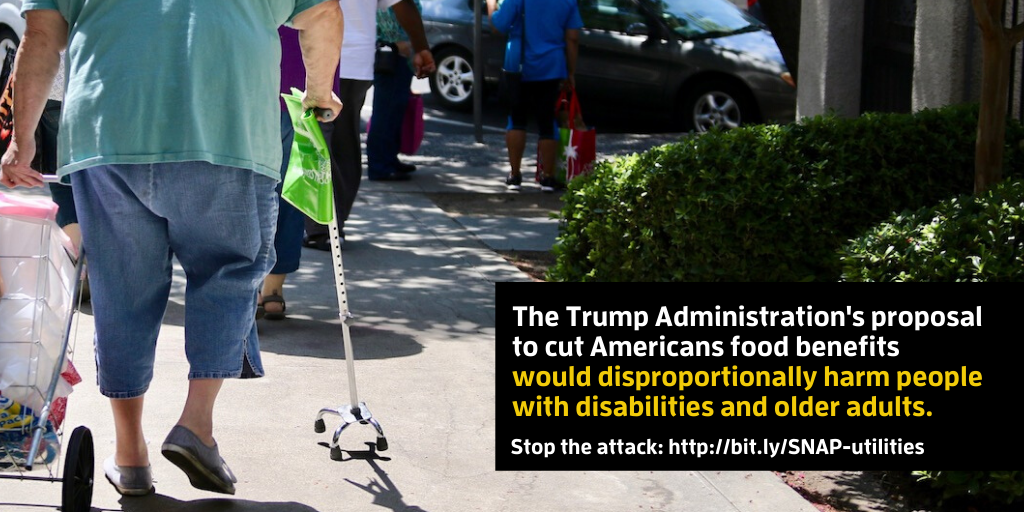The Trump Administration is proposing to cut the power of the Supplemental Nutrition Assistance Program, making it harder for millions of Americans to put food on the table. According to the United States Department of Agriculture, the average food assistance loss that would result from the proposed rule change would be “larger for households containing elderly members or individuals with disabilities, compared to the impacts on other households.”
The Trump Administration concedes that their latest proposal to cut food assistance through regulatory changes to the Supplemental Nutrition Assistance Program (known as SNAP or CalFresh in California) would reduce food assistance for an estimated thirty percent of households nationally that include individuals that have a disability, trimming their benefits by as much as $75 every month and $35 on average. Older adults would also be disproportionately harmed. According to USDA’s own impact analysis for the proposed rule, over 26% of older adults (60+) are estimated to lose their food assistance benefits as a result of the rule change, with an average loss of $36 a month. These reductions in food assistance would result from regulatory changes in how SNAP benefits are calculated.
The Trump Administration is proposing to change how SNAP accounts for utility expenses when calculating benefit levels. States have long had the option to use a specified dollar amount, known as a Standard Utility Allowance, approved by the United States Department of Agriculture, in place of actual utility costs to calculate a household’s utility expenses. The Trump Administration is now proposing to eliminate states flexibility in determining the appropriate dollar amount for those expenses and instead imposing a uniform national allowance that is lower than the actual utility costs paid by many Californians. The change would disproportionately harm people with disabilities and older adults because of the different way their SNAP benefits are calculated.
Benefit levels for SNAP are based on income and other factors. Households are entitled to deduct from their gross income amount certain housing costs (such as rent, mortgage payments, utility bills, property taxes, and insurance) that exceed 50 percent of the household’s countable income after all other deductions are subtracted, but are capped at $569 for most households. For households with adults age 60 or over, or individuals with disabilities, there is no cap on the housing cost deduction. They are allowed to subtract the full value of housing costs that exceed 50 percent of their adjusted income. This difference in how housing costs are calculated enables households with older adults and people with disabilities to qualify for a larger shelter deduction than other households and ultimately this can result in a larger SNAP benefit. In 2017, 80% of households that contained a person with a disability benefited from this flexibility in the program’s rules. In California, the proposed rule change will result in a smaller deduction for utility expenses and a resulting disproportionate reduction in average monthly benefits for many older adults and disabled participants.
People with disabilities are already at least twice as likely to live in poverty and struggle to put enough food on the table as people without disabilities. Despite this fact, the Trump Administration is moving forward with this proposed rule that would cut vital food assistance for our most vulnerable and marginalized communities and push even more older adults and people with disabilities in California into food insecurity.
Say “NO” to the proposed rule that would fuel hunger across California
Submit comments in opposition to the rule by December 2nd:
We ask that you modify the language to reflect your own thoughts and experiences so that each submitted comment counts as unique. Submit your comments here or use USDA’s comment portal here by December 2nd, 2019.
Questions? Contact: Melissa Cannon at 209.200.8446





